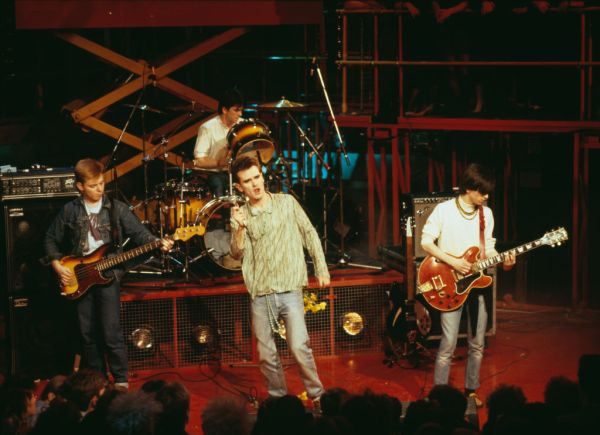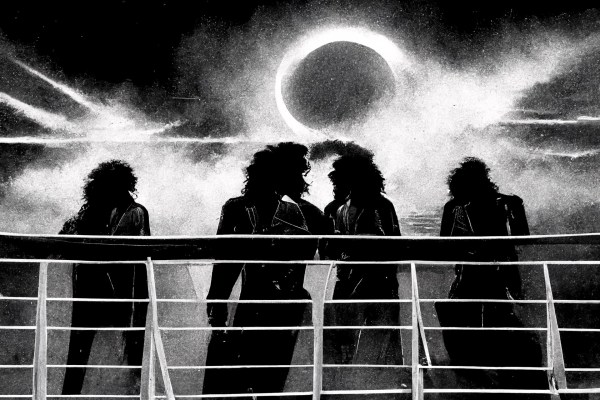When Kiss was founded in 1973, the rock band’s four original members invented characters that reflected their obsessions. Bassist Gene Simmons—who had been raised on a steady diet of comic books and monster movies—became “the Demon,” a blood-spitting, fire-breathing creature from the land of nightmares. Frontman Paul Stanley became “the Starchild,” a flamboyant, lustful figure of rock and roll showmanship who sought to bury his insecurities beneath the adulation of fans. Drummer Peter Criss, meanwhile, became “the Catman”: After surviving numerous scrapes on the rough streets of post-war Brooklyn, he was convinced he had nine lives.
Then there was Ace Frehley, the lead guitarist. Inspired by his enthusiasm for technology and all things extraterrestrial, he became “the Spaceman,” an alien from the planet “Jendell,” who fired rockets from the neck of his guitar and struggled to walk in a straight line. Naturally, he blamed the Earth’s foreign gravity rather than his taste in recreational substances.
After departing Kiss in 2001, Frehley abandoned most of the old facade. For the last 17 years, he’s been sober, performing as a solo artist in street clothes with a band of greasy, denim-clad musicians behind him. But though his stage persona has been brought down to Earth, his mind seemingly remains somewhere in the cosmos.
Sitting in his home recording studio in rural New Jersey, the walls behind him decorated with murals of stars, galaxies, and Gibson Les Pauls, Frehley begins talking to me about his latest solo album, 10,000 Volts. It bears all of his usual hallmarks. There are silly, sex-crazed lyrics that often defy basic norms of language (“Your charming allure, you’re like the girl next door / Your magic ensues all the others”); powerful riffs that instantly lodge themselves in the mind; and sloppily melodic solos redolent of the 1970s. Frehley tells me he’s “pleasantly surprised and presently pleased” with the album’s success. “I can’t believe the first single got over a million views on YouTube and had so many streams on Spotify and what have you. It’s never happened to me before with a record.”
But when I ask him a few more prosaic questions about the songwriting process and where he finds inspiration, he answers with limited enthusiasm. His true passions, it turns out, are far more exotic. They only reveal themselves when we turn to the subject of alien conspiracies.
“The last UFO I saw was probably six or seven years ago,” Frehley cheerfully recalls. “I was on a plane in first class on the right side, sitting by a window. We were going from Vegas to LA … kind of crosses over the area of Area 51, maybe within 100 miles or so. I saw a UFO come out of the clouds and then go back down. The classic UFO that you’ve seen a lot of times, you know, in pictures and stuff. It was there.” He’s reminded of the anecdote when I ask about “Up in the Sky,” a song on the new album that playfully reminds listeners, “you can’t trust the news, you can’t trust the law.”
Frehley’s always been an outspoken UFOlogist. In addition to believing that he himself is “part alien,” he’s stated in the past that aliens have abducted him and landed outside his house. He also claims to have been punched in the face by a ghost. (He refuses to say anything decisive about the existence of Bigfoot.) It’s unsurprising, then, that he thinks the U.S. government has been covering up the presence of alien life on Earth since the Roswell incident in 1947.
“I know for a fact that happened because my old girlfriend’s grandfather was stationed in Roswell and he told me it really happened,” Frehley says. “He says all that weather balloon stuff was bull—t. And he said they took the alien bodies and took them off to another base and did an autopsy. They have all the wreckage. That’s how we got our technology. We reverse-engineered a lot of the spaceships and flying saucers that have crashed over the years. Every government in the world probably has at least one or two UFOs locked up somewhere because they crash all the time.”
Much of Frehley’s thinking likely stems from his love of vintage sci-fi movies. He’s particularly fond of Forbidden Planet and The Day the Earth Stood Still (both from 1956), and he bemoans a perceived lack of creativity in contemporary cinema. He describes director Roland Emmerich’s critically reviled Moonfall (2022) as one of his favorite additions to the genre in recent years—not for its quality, but for its supposed insights into our solar system.
“I think the moon is hollow,” Frehley tells me. “They’ve searched the solar system for other planets with a moon our size—can’t find it. And isn’t it interesting that when the moon crosses between the Earth and the sun, it’s exactly the same size and it blocks out the sun? I mean, what in the f— are the odds of that? That doesn’t happen; it was made! It’s an artificial object.” The proof, he argues, is in the recent discovery of unusual structures on the moon’s surface by a Chinese rover.
Frehley was raised in the Bronx, where he joined a street gang and resisted applying himself in school. Street fights, burglaries, and regular visits to the local jail defined what he describes as a uniquely cinematic early life. At 13, he received a guitar for Christmas, and the instrument quickly consumed him. “Music kind of saved my life,” Frehley recalls. “The guys in the gang used to call me up and go, ‘We’re gonna steal some cars this weekend or break into a warehouse.’ And I used to say, ‘I can’t go, I got a gig.’” In 1972, answering an ad in The Village Voice led Frehley to Simmons, Stanley, and Criss, with whom he formed Kiss the next year and rose to international superstardom soon after.
Frehley believes that destiny, or some other metaphysical force, brought the original members of Kiss together and helped him survive a series of subsequent brushes with death, including car crashes and electrocution on an unsafe stage set. “There’s been so many coincidences in my life of strange events,” Frehley says. “And it just doesn’t make sense that it happened by accident.” Naturally, he also believes he’s equipped with supernatural abilities that allow him to recognize this truth. “In a way, I’m a prophet. I can prophesize things; I can see things that are gonna happen in the future that always do. That power comes and goes. It’s not something I can just snap my fingers and tell you what's gonna happen. But I’ve always had a sixth sense.”
If life follows a script, who is its author? God, perhaps. But Frehley counts that as one of several possibilities. Other options include “aliens up above or under Antarctica with a supercomputer that controls everybody’s lives,” and the ever-reliable idea that we’re actually living in a simulation.
“The Matrix was one of my favorite movies when it came out, because it rang a bell,” Frehley tells me. “I remember when I was like 13, 14, I always had this feeling that I was being watched from above, you know? That somehow, some way, I wasn’t in control so much of my destiny. I’d get ideas, but where did they come from? Like, somebody whispering in my ear.” In fairness, most of Frehley’s thoughts do seem beyond the realm of conventional psychology.
Before we can continue down the path of fatalism, Frehley briefly interrupts our conversation for a (presumably predestined) bathroom break. “My problem is I drink at least eight of these a day,” he tells me, pointing at his water bottle. “That’s one of the ways I lost weight.” When he returns and embarks on an unprompted rant about sex changes in children—“There’s man and there’s woman; it’s been like that since the beginning of f—ing time” —I realize we’ve probably covered enough ground.
It’s not unusual for celebrities to be drawn toward conspiracy theories, particularly within the world of music. Sometimes, as in Frehley’s case, the consequences of this can simply be amusing. Even in the early days of Kiss, Frehley was an eccentric sort with a wild imagination, and his otherworldly fixations have come to permeate his work. For his fans, a new album lacking in references to UFO cover-ups or intergalactic adventures would feel not only incomplete but positively deprived. Outlandish beliefs are an essential feature of Frehley’s persona.
But in other cases, when pop stars don their tin foil hats, the results are far more sinister. In recent years we’ve seen Madonna propagate anti-vaccine falsehoods and Ice Cube decorate his Twitter account with antisemitic imagery. Earlier this month, Pink Floyd co-founder Roger Waters appeared on Piers Morgan’s talk show, Uncensored, to discuss the Israel-Palestine conflict. He argued, in distinctly deranged fashion, that there is “no evidence” Hamas committed acts of rape and sexual abuse on October 7, branding those who disagree “filthy, disgusting” liars.
Many musicians tend to be unconventional in their behavior and heterodox in their attitudes. After all, they choose a profession that encourages experimentation and defies the norms of 9-to-5 work culture. But say what you will about Frehley’s paranormal instincts; there’s an enormous difference between peddling pernicious lies about a globally significant war and believing that little green men once set foot in your backyard.
I end my chat with Frehley by asking him about the future. Now 73, he has nothing left to prove as a musician, but he also shows no desire to retire from the road. If his body objects, he believes he’ll turn to other ventures. Television, possibly. Or maybe engineering—he’d like to build a prototype for a collapsible guitar that could fit inside a Halliburton briefcase. He’s confident nothing is beyond his reach: “I have a 163 IQ so you know, anything above 160 is considered genius. I don’t know.” Undoubtedly, whatever comes next for Frehley will be just as peculiar as any other facet of his universe. And perhaps his fans should accept that without asking too many follow-up questions. “Like I said, one day at a time,” he tells me as we part ways, erupting into a bird-like cackle. “I just take what they throw at me.”






Please note that we at The Dispatch hold ourselves, our work, and our commenters to a higher standard than other places on the internet. We welcome comments that foster genuine debate or discussion—including comments critical of us or our work—but responses that include ad hominem attacks on fellow Dispatch members or are intended to stoke fear and anger may be moderated.
With your membership, you only have the ability to comment on The Morning Dispatch articles. Consider upgrading to join the conversation everywhere.